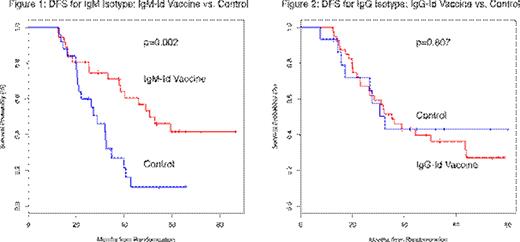Abstract
Abstract 429
Tumor-derived idiotype (Id) protein conjugated to keyhole limpet hemocyanin (KLH) administered with granulocyte-monocyte colony-stimulating factor (GM-CSF) can induce follicular lymphoma (FL)-specific immune responses that target tumor-specific antigenic determinants within the tumor cell's unique immunoglobulin (Ig) variable region (Fv). While Fv idiotypic determinants serve as specific tumor antigens, preclinical evidence suggests that the isotype of the Ig constant region (Fc) may independently influence the immunogenicity of hybridoma-derived immunoglobulins. Whereas Ids that have switched to IgG were tolerogenic, Ids of their IgM progenitors were highly immunogenic (Reitan et al. Proc Natl Acad Sci U S A, 2002). Thus, we examined the clinical impact of tumor Ig isotype on disease-free survival (DFS) within a prospective randomized double-blind placebo-controlled multicenter phase III study of patient-specific tumor heterohybridoma-derived Id vaccine in advanced stage previously untreated FL patients with a lymph node adequate for vaccine production (≥ 2cm).
Patients achieving complete response (CR) or complete response unconfirmed (CRu) after chemotherapy (PACE: prednisone, doxorubicin, cyclophosphamide, etoposide) were stratified by International Prognostic Index risk group and number of cycles of PACE and randomized 2:1 to receive tumor isotype-matched Id vaccine (Id-KLH/GM-CSF) or control (KLH/GM-CSF). The primary endpoint was DFS.
234 patients were enrolled; 177 (76%) achieved CR/CRu and were randomized. Of 177 randomized patients, 117 maintained CR/CRu ≥ 6 months per protocol requirement and then received at least one dose of vaccine, 55 relapsed before vaccination, 4 were vaccine manufacturing failures, and 1 violated protocol. Patients who received ≥ 1 vaccine dose constituted the modified intent-to-treat population for determination of efficacy. 76 patients received Id vaccine and 41 patients received the control. At a median follow-up of 56.6 months (range 12.6 – 89.3), median DFS after randomization for the Id vaccine arm was 44.2 months versus 30.6 months for the control arm (P = 0.048; HR = 0.62; 95% CI: 0.39–0.99). Among 76 patients receiving Id vaccine, 36 received IgM-Id vaccines and 40 received IgG-Id vaccines corresponding to their tumor Ig isotype. Of 41 patients receiving control, 25 had tumors with IgM isotype and 15 had tumors with IgG isotype; 1 patient had a tumor with mixed IgM/IgG isotypes. Among 36 patients with IgM tumor isotype receiving an IgM-Id vaccine, median time to relapse after randomization was 50.6 months, versus 27.1 months in the IgM tumor isotype control-treated patients (log-rank p=0.002; HR = 0.36 (p=0.003); [95% CI: 0.19–0.71]) [Figure 1]. Among 40 patients with IgG tumor isotype receiving an IgG-Id vaccine, median time to relapse after randomization was 35.1 months, versus 32.4 months in control-treated patients with IgG tumor isotype (log-rank p = 0.807; HR = 1.1 (p=0.807); [95% CI: 0.50–2.44]) [Figure 2]. It must be noted that although this trial was not powered to address such subsetting, the dramatically different results suggest that the treatment effect is different in the two groups, with a surprisingly small p-value of 0.085.
Our results suggest that the isotype of an Id vaccine may influence DFS in FL patients vaccinated in first complete remission. Unexpectedly, we observed that the IgM-Id vaccine significantly prolonged remission duration in comparison to the IgG-Id vaccine. Compared to other phase III Id vaccine trials that used recombinant Id vaccines with IgG constant regions for all patients, the positive outcome of our study may reflect the use of hybridomas to produce Id protein with variable and constant regions identical to patient tumor Ig. Additional studies are expected to further evaluate the effect of Id vaccine isotype on clinical outcome in FL and other B-cell malignancies. If confirmed, our findings will have profound implications on Id vaccine production strategies and clinical development.
Biovest International, Inc.: Research Funding. Santos:Biovest International, Inc.: Employment. Neelapu:Biovest International, Inc.: Research Funding. Popa:Biovest International, Inc.: Employment. McCord:Biovest International, Inc.: Employment. Kwak:Biovest International, Inc.: Consultancy.
Author notes
Asterisk with author names denotes non-ASH members.


